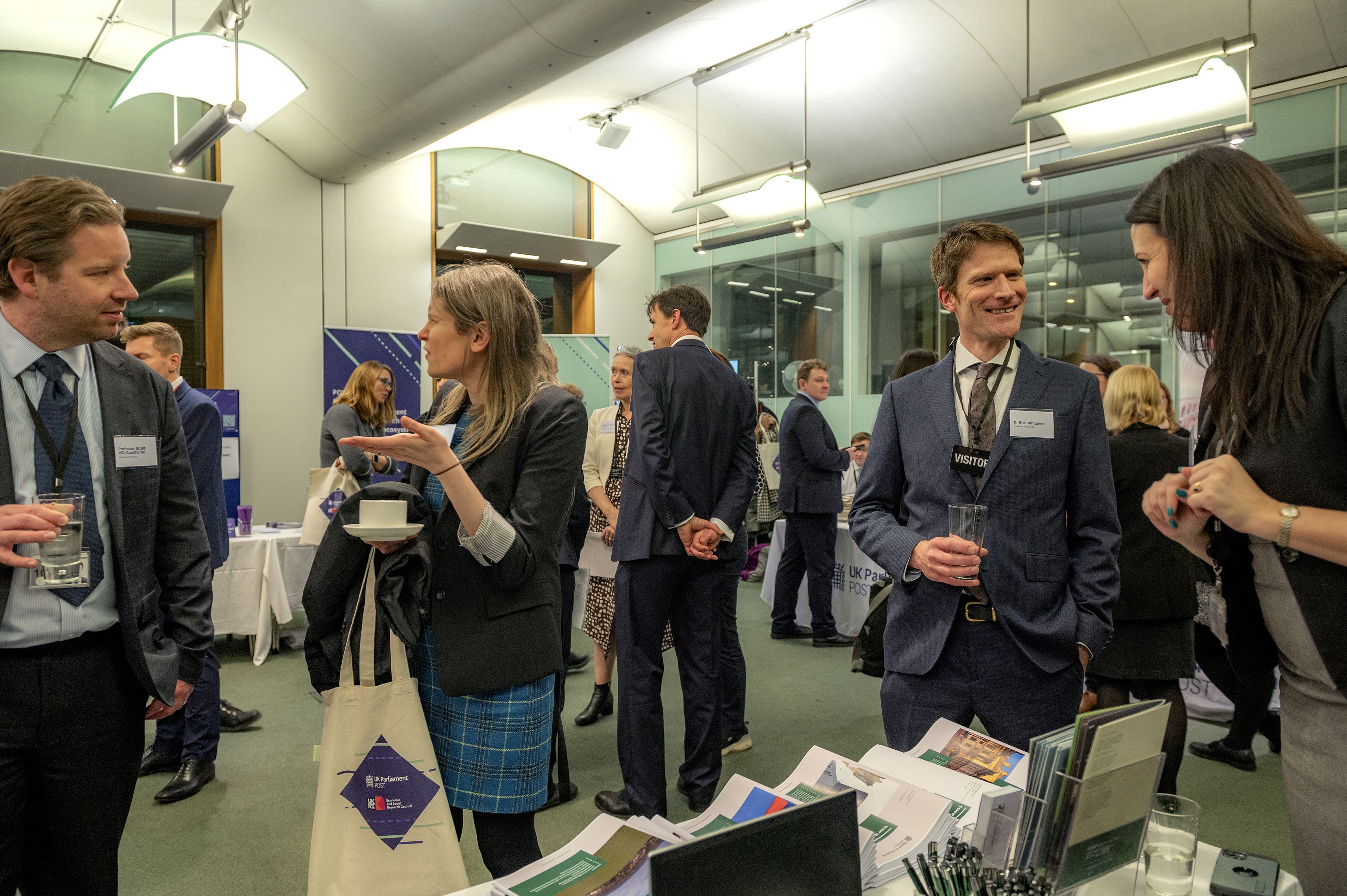Rick Whitaker: A year as Thematic Research Lead in Parliament
Hear from Thematic Research Lead for Parliament, Public Administration and Constitution Prof Richard Whitaker on his work bringing research into Parliament.

What is a Thematic Research Lead?
Thematic Research Leads (TRLs) are mid-career researchers embedded three days a week in Parliament.
The Thematic Research Lead network was started in 2023 to facilitate and enhance the use of research evidence and expertise in Parliament (both in the House of Commons and House of Lords) through effective knowledge exchange and collaboration. Each TRL leads on a specific policy area.
To achieve this, they conduct three primary activities:
- strategic support for the production and delivery of research evidence for Parliament, within a broad policy area
- activities to support the development of a research and innovation landscape that facilitates and encourages knowledge exchange between Parliament and the research community
- participation in a network of Thematic Research Leads to share intelligence and insights across policy areas.
There are currently three TRLs working in Parliament, covering the policy areas of international affairs and national security; climate and environment; and Parliament, public administration and constitution.
Meet Rick
Rick Whitaker is Professor of Politics at the University of Leicester. His research focuses on the study of legislatures, particularly the UK and European Parliaments, as well as British political parties and European integration.
"Working with staff across the different legislatures in the UK has been fascinating for me. This is not only because my own research focuses on parliaments but also because I’ve been able to bring together academics and parliamentary staff focusing on legislative and constitutional issues, ultimately with the aim of improving the ability of parliaments to scrutinise governments in the UK."
Read on to hear from Rick about his work and experiences as a TRL in Parliament.

Working as a Thematic Research Lead
Working as a Thematic Research Lead has been a fascinating experience. My own academic research is on legislatures including the UK Parliament, so the TRL role means I have had the chance to work in an institution that I study. I arrived thinking I knew something about parliamentary procedure but quickly discovered that my knowledge was just the tip of the iceberg!
Having the chance to work with staff in the Commons Library and select committee teams has helped me learn much about how Parliament works from the inside. But I hope this has also worked both ways as through various projects, I’ve been able to bring the fruits of academic research into the Parliament, Public Administration and Constitution (PPAC) hub in which I am based.
As a TRL I have organised seminars for parliamentary staff, bringing in academics working on topics such as devolution, political parties and elections. I am also involved in writing a briefing for the Senedd on behalf of the Commons Library. I have helped to coordinate the horizon scanning for my hub, as we look forward to events that might follow a general election and work out the implications for staff involved with constitutional, public administration and parliament-related topics. I have helped parliamentary committees find the best researchers for their inquiries and brought the latest research on areas such as voter identification at UK elections to the attention of committees.
Delegated powers and framework legislation
One of the major projects I have been involved with this year is co-writing a Commons Library Briefing on delegated powers and framework legislation. Many Acts of Parliament give ministers powers to make laws. These delegated powers are often used in areas of policy where minor changes might be needed - for example, ministers might be delegated power to change the levels of welfare benefits, meaning that minor changes could be made without making an Act of Parliament.
Some bills, often known as framework or skeleton bills, achieve many of their aims through delegated powers. This can be a problem as it can leave Parliament with little opportunity to scrutinise policies to be made by government. Delegated legislation is subject to far less scrutiny than primary legislation.
Two committees in the House of Lords raised concerns about this in their reports Democracy Denied? and Government by Diktat. I hope to build on some of their findings in my work.
Writing on this topic has given me the chance to work closely with staff in the Commons Library, Commons select committee teams and with staff from committees in the House of Lords that specialise in delegated powers. I have had the chance to gather my own data and summarise academic and think-tank research on this topic. This task has also provided me with the opportunity to learn to write for different audiences in the form of MPs, parliamentary staff and the interested public.

What next?
During 2024, I will be working on a new programme of seminars, bringing the latest academic research into Parliament on a wide range of topics linked to the PPAC hub. Among other things, I will be completing a piece of research for the Senedd on skeleton bills and organising a panel of academics to talk to Senedd staff about this topic.
In the longer term I hope to take the connections and knowledge of parliamentary procedure that I have gained into my academic work, developing research that has a greater chance of impact on policy makers.
Find out more
Applications for the 2024-2026 TRLs have closed. Sign up to the Knowledge Exchange Unit weekly round-up to receive a wide range of engagement opportunities including fellowships, future Thematic Research Lead positions and other opportunities for experts and researchers such as contributing to Select Committees and POSTnotes.
This page was produced by the Knowledge Exchange Unit, part of the Parliamentary Office of Science and Technology. Find out more about us.